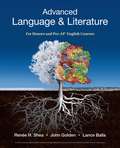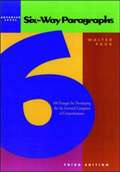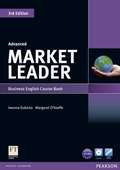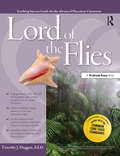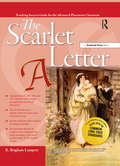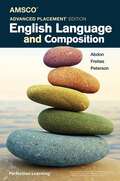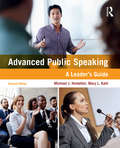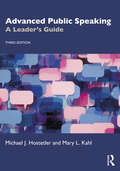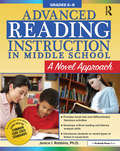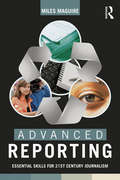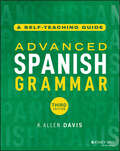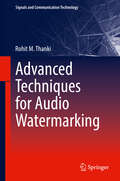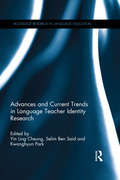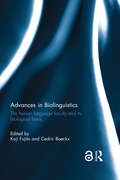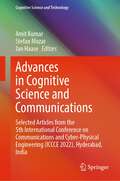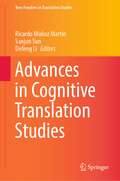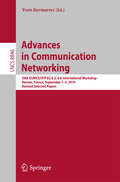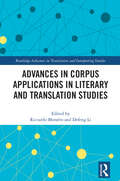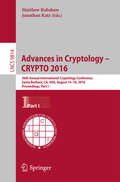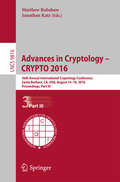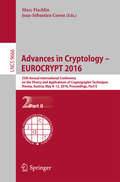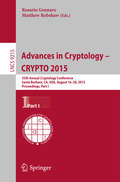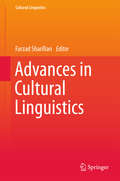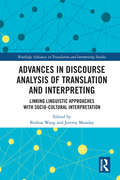- Table View
- List View
Advanced Language & Literature for Honors and Pre-AP English Courses
by Renée H. Shea John Golden Lance BallaAP® teachers know the roots of AP® success are established in the earlier grades. That is the idea behind Advanced Language & Literature—a complete solution for 10th grade honors and Pre-AP® English classes. Driven by the expertise of Renee Shea, John Golden, and Lance Balla, this introduction to literature and nonfiction, reading and writing, analysis and argument, is both challenging and nurturing; a book full of big ideas, thought-provoking texts, and all of the support young minds need to be prepared for AP® success. *Pre-AP is a trademark registered and/or owned by the College Board, which was not involved in the production of and does not endorse this product.
Advanced Level: Six-Way Paragraphs
by Walter PaukSix-Way Paragraphs, a three-level series, teaches the basic skills necessary for reading factual material through the use of the following six types of questions: subject matter, main idea, supporting details, conclusions, clarifying devices, and vocabulary in context.
Advanced Market Leader: Business Leader Course Book 3rd edition
by Iwonna Dubicka Margaret O'Keeffe'Market Leader' is the major business English course for tomorrow's business leaders. Incorporating material from the Financial Times, it brings real business issues right into the classroom.
Advanced Placement Classroom: Lord of the Flies (Teaching Success Guides For The Advanced Placement Classroom Ser. #0)
by Timothy J. DugganAdvanced Placement Classroom: Lord of the Flies takes a fresh approach to a school classic by offering an abundance of student-centered classroom ideas. A large menu of rigorous choices will engage both teachers and students in the process of building interpretations through close reading, collaboration, and active learning. Clearly explained prereading, reading, and post-reading tasks help students to develop their individual encounters with the text and then enter the conversation of literary scholars. Additional chapters explore the interface between the world of the text and the text in the world, including technology integration. Sample AP prompts and essay analyses are included. Grades 9-12
Advanced Placement Classroom: The Scarlet Letter
by R. Brigham LampertAdvanced Placement Classroom: The Scarlet Letter provides teachers with a user-friendly field-tested guide to teaching one of the truly great American novels. Considering a wide range of academically interpretive methodologies, it moves beyond basic elements of plot, characterization, and theme into a multifaceted, skill-based, and critically inquisitive approach to instruction. Designed pragmatically with the AP English Literature exam as an end goal, the book includes dozens of ready-to-use assignments, prompts, quizzes, rubrics, and lesson plans, all aiding students' ultimate success.
Advanced Placement English Language and Composition
by Lauren Peterson Brandon Abdon Timothy FreitasAdvanced Placement English Language and Composition
Advanced Public Speaking: A Leader's Guide
by Mary L. Kahl Michael J. HostetlerAdvanced Public Speaking: A Leader's Guide is a comprehensive textbook designed to serve as a speech-making reference for upper-level undergraduate students. Now in its second edition, this volume offers brand new classroom-tested chapter assignments, updated examples, and new content on speaking to international and remote audiences. An instructor’s manual and test bank are available for download on the book’s companion website, offering everything from guidance in constructing a syllabus, to lecture suggestions, to classroom activities. This student-engagement focused and flexible text offers students the opportunity to increase their speaking abilities across a variety of more specific and complex contexts.
Advanced Public Speaking: A Leader's Guide
by Mary L. Kahl Michael J. HostetlerNow in its third edition, this comprehensive textbook is designed to serve as a speech-making reference for advanced students of public speaking.The book presumes that readers have prior experience with basic public speaking skills and seeks to enhance those abilities with references to classical concepts, the inclusion of sample speeches, and questions for speech criticism. This new edition includes a greater diversity of speeches and new material on populist rhetoric and civility to outline the importance of civic discourse in an age of polarization. It also includes suggestions for speaking to remote audiences.Providing users with the opportunity to increase their speaking abilities across a wide variety of complex and specific contexts, this student-engagement focused and flexible text serves as a core textbook for upper-level undergraduate public speaking courses.Online resources for instructors include an instructor’s manual and test bank offering guidance on syllabus construction, lecture content, and classroom activities. They are available at www.routledge.com/9781032531861.
Advanced Reading Instruction in Middle School: A Novel Approach (Grades 6-8)
by Janice I. RobbinsAddressing the needs of academically advanced young adolescents in reading is a tall order. Advanced Reading Instruction in Middle School offers teachers a structured process for guiding students in preparing for collaborative discussions about books. Structured discussions enable students to examine the author's work together as they respond to essential questions, using evidence from the reading. Students are directed to make personal connections to story characters, plots, and settings. They are asked to explore the writer's craft through the examination of selected words, structures, settings, and literary devices incorporated in the novels. This guide includes specific literary analysis activities suitable for the six types of fiction presented and offers annotated lists of recommended advanced-level books of each type, including those recommended in the CCSS. The guide also supports the social and emotional issues of early adolescents, offering specific works suitable for a range of common topics such as identity, friendships, high expectations, and feelings of isolation.Grades 6-8
Advanced Reporting: Essential Skills for 21st Century Journalism
by Miles MaguireNews gathering is a large, complicated and often messy task that has traditionally been viewed by journalists as irretrievably idiosyncratic, best learned through trial and error. Advanced Reporting takes the opposite approach, focusing on reporting as a process of triangulation based on three essential activities: analyzing documents, making observations and conducting interviews. In this readable book, veteran journalism professor Miles Maguire shows how the best reporters use these three tools in a way that allows them to cross-check and authenticate facts, to reduce or eliminate unsupportable allegations and to take readers and viewers to a deeper level of insight and understanding. This book will help to prepare students for a profession marked by increasing complexity and competition. To succeed in this environment, journalists must learn to make the most of digital media to intensify the impact of their work. At the same time, reporters must contend with a host of sophisticated public relations techniques while engaging with news audiences that no longer just consume journalism, but also collaborate in its creation. Discussion questions and exercises help students put theory into practice.
Advanced Spanish Grammar: A Self-Teaching Guide
by K. Allen DavisMaster the finer points of Spanish with this complete, accessible guide Advanced Spanish Grammar, Third Edition, is ideal for Spanish-language learners who are unsure about conjugating irregular Spanish verbs, using the subjunctive, or determining the appropriate definite article. Professor K. Allen Davis clarifies grammatical structures and explains vocabulary usage to help you advance your Spanish knowledge. Whether you need extra help for a course, want a quick review for a test, or simply want to brush up your language skills, this is the book to have. In this completely revised edition of Advanced Spanish Grammar, you will: Follow an interactive format that lets you work at your own pace Complete exercises to practice difficult words and structures and reinforce what you've learned Learn more than 1,000 practical Spanish words and terms Get explanations of the more intricate grammatical rules of Spanish Gain quick access to existing audiovisual material by native speakers. For intermediate to advanced Spanish learners, Advanced Spanish Grammar is an excellent self-paced guide to take you to the next level. It also works wonderfully as a course textbook at the secondary and postsecondary levels.
Advanced Techniques for Audio Watermarking (Signals and Communication Technology)
by Rohit M. ThankiThis book provides information on digital audio watermarking, its applications, and its evaluation for copyright protection of audio signals – both basic and advanced. The author covers various advanced digital audio watermarking algorithms that can be used for copyright protection of audio signals. These algorithms are implemented using hybridization of advanced signal processing transforms such as fast discrete curvelet transform (FDCuT), redundant discrete wavelet transform (RDWT), and another signal processing transform such as discrete cosine transform (DCT). In these algorithms, Arnold scrambling is used to enhance the security of the watermark logo. This book is divided in to three portions: basic audio watermarking and its classification, audio watermarking algorithms, and audio watermarking algorithms using advance signal transforms. The book also covers optimization based audio watermarking.Describes basic of digital audio watermarking and its applications, including evaluation parameters for digital audio watermarking algorithms;Provides audio watermarking algorithms using advanced signal transformations;Provides optimization based audio watermarking algorithms.
Advanced Word Power
by Beth Johnson Susan GamerYou can never know enough words. Every person you meet knows an extra word you would not be familiar with and he/ she as well. This book invites you to Advanced Word Power. It teaches 30 power words in the college vocabulary likely to be used in examinations and tests.
Advances and Current Trends in Language Teacher Identity Research (Routledge Research in Language Education)
by Selim Ben Said Yin Ling Cheung Kwanghyun ParkThis book presents the latest research on understanding language teacher identity and development for both novice and experienced researchers and educators, and introduces non-experts in language teacher education to key topics in teacher identity research. It covers a wide range of backgrounds, themes, and subjects pertaining to language teacher identity and development. Some of these include the effects of apprenticeship in doctoral training on novice teacher identity; the impacts of mid-career redundancy on the professional identities of teachers; challenges faced by teachers in the construction of their professional identities; the emerging professional identity of pre-service teachers; teacher identity development of beginning teachers; the role of emotions in the professional identities of non-native English speaking teachers; the negotiation of professional identities by female academics. Advances and Current Trends in Language Teacher Identity Research will appeal to academics in ELT/TESOL/applied linguistics. It will also be useful to those who are non-experts in language teacher education, yet still need to know about theories and recent advances in the area due to varying reasons including their affiliation to a teacher training institute; needs to participate in projects on language teacher education; and teaching a course for pre-service and in-service language teachers.
Advances in Biolinguistics: The Human Language Faculty and Its Biological Basis
by Koji Fujita and Cedric BoeckxBiolinguistics is a highly interdisciplinary field that seeks the rapprochement between linguistics and biology. Linking theoretical linguistics, theoretical biology, genetics, neuroscience and cognitive psychology, this book offers a collection of chapters situating the enterprise conceptually, highlighting both the promises and challenges of the field, and chapters focusing on the challenges and prospects of taking interdisciplinarity seriously. It provides concrete illustrations of some of the cutting-edge research in biolinguistics and piques the interest of undergraduate students looking for a field to major in and inspires graduate students on possible research directions. It is also meant to show to specialists in adjacent fields how a particular strand of theoretical linguistics relates to their concerns, and in so doing, the book intends to foster collaboration across disciplines. Chapter 1 of this book is freely available as a downloadable Open Access PDF at http://www.taylorfrancis.com under a Creative Commons Attribution-Non Commercial-No Derivatives (CC-BY-NC-ND) 4.0 license.
Advances in Cognitive Science and Communications: Selected Articles from the 5th International Conference on Communications and Cyber-Physical Engineering (ICCCE 2022), Hyderabad, India (Cognitive Science and Technology)
by Amit Kumar Jan Haase Stefan MozarThis book includes selected peer reviewed articles from The 5th International Conference on Communications and Cyber-Physical Engineering (ICCCE 2022), held on 29th and 30th April 2022 in Hyderabad, India. Articles presented here relate to next generation cognitive systems, neuroscience, cyber physical systems and their impact on communication technologies. The book includes content related to cognitive disorders, computational intelligence, fuzzy logics, evolutionary computing that are important for deriving a roadmap for future research on cognitive science/systems and communications. ICCCE is one of the most prestigious conferences conceptualized in the transdisciplinary field of cognitive science and communication technology areas like methods of linguistics, computer science, philosophy, and neuroscience. This edition of the conference was attended by several Industry professionals and academicians, and Government agencies to cover a broad range of perspectives, practices, and technical expertise related to cognitive technologies and next generation communications. Articles presented cover innovations from industry, outcome of implementations and cutting-edge research outcomes from cognitive science/technology areas and their impact on communication technology and cyber physical engineering.
Advances in Cognitive Translation Studies (New Frontiers in Translation Studies)
by Defeng Li Ricardo Muñoz Martín Sanjun SunThis book presents the latest theoretical and empirical advances in cognitive translation studies. It involves the modes of written translation, interpreting, sight translation, and computer-aided translation. In separate chapters, this book proposes a new analytical framework for studying keylogged translation processes, a framework that reconciles a sociological and a psychological approach for studying expertise in translation, and a pedagogical model of translation competence. It expands the investigation of cognitive processes by considering the role of emotional factors, reviews, and develops the effort models of interpreting as a didactic construct. The empirical studies in this book revolve around cognitive load and effort; they explore the influences of text factors (e.g., metaphors, complex lexical items, directionality) while taking into account translator factors and evaluate the user experience of computer-aided translation tools.
Advances in Communication Networking: 20th EUNICE/IFIP EG 6.2, 6.6 International Workshop, Rennes, France, September 1-5, 2014, Revised Selected Papers (Lecture Notes in Computer Science #8846)
by Yvon KermarrecThis book constitutes the refereed proceedings of the 20th EUNICE/IFIP WG 6. 2, 6. 6 Workshop on Advances in Communication Networking, EUNICE 2014, held in Rennes, France, in September 2014. The 21 papers presented were carefully reviewed and selected from numerous submissions and present aspects in the field of information and communication technologies.
Advances in Corpus Applications in Literary and Translation Studies (Routledge Advances in Translation and Interpreting Studies)
by Defeng Li Riccardo MorattoProfessor Riccardo Moratto and Professor Defeng Li present contributions focusing on the interdisciplinarity of corpus studies, with a special emphasis on literary and translation studies which offer a broad and varied picture of the promise and potential of methods and approaches. Inside scholars share their research findings concerning current advances in corpus applications in literary and translation studies and explore possible and tangible collaborative research projects. The volume is split into two sections focusing on the applications of corpora in literary studies and translation studies. Issues explored include historical backgrounds, current trends, theories, methodologies, operational methods, and techniques, as well as training of research students. This international, dynamic, and interdisciplinary exploration of corpus studies and corpus application in various cultural contexts and different countries will provide valuable insights for any researcher in literary or translation studies who wishes to have a better understanding when working with corpora.
Advances in Cryptology - CRYPTO 2016: 36th Annual International Cryptology Conference, Santa Barbara, CA, USA, August 14-18, 2016, Proceedings, Part I (Lecture Notes in Computer Science #9814)
by Matthew Robshaw Jonathan KatzThe three volume-set, LNCS 9814, LNCS 9815, and LNCS 9816, constitutes the refereed proceedings of the 36th Annual International Cryptology Conference, CRYPTO 2016, held in Santa Barbara, CA, USA, in August 2016. The 70 revised full papers presented were carefully reviewed and selected from 274 submissions. The papers are organized in the following topical sections: provable security for symmetric cryptography; asymmetric cryptography and cryptanalysis; cryptography in theory and practice; compromised systems; symmetric cryptanalysis; algorithmic number theory; symmetric primitives; asymmetric cryptography; symmetric cryptography; cryptanalytic tools; hardware-oriented cryptography; secure computation and protocols; obfuscation; quantum techniques; spooky encryption; IBE, ABE, and functional encryption; automated tools and synthesis; zero knowledge; theory.
Advances in Cryptology - CRYPTO 2016: 36th Annual International Cryptology Conference, Santa Barbara, CA, USA, August 14-18, 2016, Proceedings, Part III (Lecture Notes in Computer Science #9816)
by Matthew Robshaw Jonathan KatzThe three volume-set, LNCS 9814, LNCS 9815, and LNCS 9816, constitutes the refereed proceedings of the 36th Annual International Cryptology Conference, CRYPTO 2016, held in Santa Barbara, CA, USA, in August 2016. The 70 revised full papers presented were carefully reviewed and selected from 274 submissions. The papers are organized in the following topical sections: provable security for symmetric cryptography; asymmetric cryptography and cryptanalysis; cryptography in theory and practice; compromised systems; symmetric cryptanalysis; algorithmic number theory; symmetric primitives; asymmetric cryptography; symmetric cryptography; cryptanalytic tools; hardware-oriented cryptography; secure computation and protocols; obfuscation; quantum techniques; spooky encryption; IBE, ABE, and functional encryption; automated tools and synthesis; zero knowledge; theory.
Advances in Cryptology - EUROCRYPT 2016: 35th Annual International Conference on the Theory and Applications of Cryptographic Techniques, Vienna, Austria, May 8-12, 2016, Proceedings, Part II (Lecture Notes in Computer Science #9666)
by Marc Fischlin Jean-Sébastien CoronThe two-volume proceedings LNCS 9665 + LNCS 9666 constitutes the thoroughly refereed proceedings of the 35th Annual International Conference on the Theory and Applications of Cryptographic Techniques, EUROCRYPT 2016, held in Vienna, Austria, in May 2016. The 62 full papers included in these volumes were carefully reviewed and selected from 274 submissions. The papers are organized in topical sections named: (pseudo)randomness; LPN/LWE; cryptanalysis; masking; fully homomorphic encryption; number theory; hash functions; multilinear maps; message authentification codes; attacks on SSL/TLS; real-world protocols; robust designs; lattice reduction; latticed-based schemes; zero-knowled≥ pseudorandom functions; multi-party computation; separations; protocols; round complexity; commitments; lattices; leaka≥ in differentiability; obfuscation; and automated analysis, functional encryption, and non-malleable codes.
Advances in Cryptology -- CRYPTO 2015: 35th Annual Cryptology Conference, Santa Barbara, CA, USA, August 16-20, 2015, Proceedings, Part I (Lecture Notes in Computer Science #9215)
by Rosario Gennaro Matthew RobshawThe two volume-set, LNCS 9215 and LNCS 9216, constitutes the refereed proceedings of the 35th Annual International Cryptology Conference, CRYPTO 2015, held in Santa Barbara, CA, USA, in August 2015. The 74 revised full papers presented were carefully reviewed and selected from 266 submissions. The papers are organized in the following topical sections: lattice-based cryptography; cryptanalytic insights; modes and constructions; multilinear maps and IO; pseudorandomness; block cipher cryptanalysis; integrity; assumptions; hash functions and stream cipher cryptanalysis; implementations; multiparty computation; zero-knowledge; theory; signatures; non-signaling and information-theoretic crypto; attribute-based encryption; new primitives; and fully homomorphic/functional encryption.
Advances in Cultural Linguistics (Cultural Linguistics)
by Farzad SharifianThis groundbreaking collection represents the broad scope of cutting-edge research in Cultural Linguistics, a burgeoning field of interdisciplinary inquiry into the relationships between language and cultural cognition. The materials surveyed in its chapters demonstrate how cultural conceptualisations encoded in language relate to all aspects of human life - from emotion and embodiment to kinship, religion, marriage and politics, even the understanding of life and death. Cultural Linguistics draws on cognitive science, complexity science and distributed cognition, among other disciplines, to strengthen its theoretical and analytical base. The tools it has developed have worked toward insightful investigations into the cultural grounding of language in numerous applied domains, including World Englishes, cross-cultural/intercultural pragmatics, intercultural communication, Teaching English as an International Language (TEIL), and political discourse analysis.
Advances in Discourse Analysis of Translation and Interpreting: Linking Linguistic Approaches with Socio-cultural Interpretation (Routledge Advances in Translation and Interpreting Studies)
by Binhua Wang; Jeremy MundayThis edited thematic collection features latest developments of discourse analysis in translation and interpreting studies. It investigates the process of how cultural and ideological intervention is conducted in translation and interpreting using a wide array of discourse analysis and systemic functional linguistic approaches and drawing on empirical data from the Chinese context. The book is divided into four main sections: I. uncovering positioning and ideology in interpreting and translation, II. linking linguistic approach with socio-cultural interpretation, III. discourse analysis into news translation and IV. analysis of multimodal and intersemiotic discourse in translation. The different approaches to discourse analysis provide a much-needed contribution to the field of translation and interpreting studies. This combination of discourse analysis and corpus analysis demonstrates the interconnectedness of these fields and offers a rich source of conceptual and methodological tools. This book will appeal to scholars and research students in translation and interpreting studies, cross-linguistic discourse analysis and Chinese studies.
